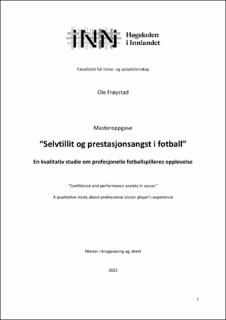| dc.contributor.advisor | | |
| dc.contributor.author | Ole Frøystad | |
| dc.date.accessioned | 2022-09-20T16:10:24Z | |
| dc.date.available | 2022-09-20T16:10:24Z | |
| dc.date.issued | 2022 | |
| dc.identifier | no.inn:inspera:111683710:67551060 | |
| dc.identifier.uri | https://hdl.handle.net/11250/3019297 | |
| dc.description.abstract | Sammendrag
Hensikten med denne studien har vært å undersøke og belyse hvordan selvtillit og prestasjonsangst påvirker prestasjonen til fotballspillere på fotballbanen.
Dette er en kvalitativ studie hvor datagrunnlaget har blitt skapt gjennom fem intervjuer. Deltakerne består av profesjonelle fotballspillere, med erfaring fra toppklubber og landslag. Dataene er blitt generert og analysert i tråd med en tematisk analysemetode. Deretter har resultatene blitt fremstilt og diskutert i lys av det teoretiske rammeverket for studien: Self Efficacy av Albert Bandura og Stressteorien til Lazarus og Folkman.
Funnene viser at selvtillit og prestasjonsangst påvirker prestasjonen til fotballspillere. Sterke opplevelser av angst fører til at spillere mister gleden og takker nei til attraktive tilbud fra større klubber og landslag. Det kan også føre til en tidlig avsluttet fotballkarriere. Lav selvtillit og angst gjør at spillernes prestasjon reduseres betydelig. Flere negative forandringer forekommer - de vil ikke ha ball og de gjør seg mindre spillbare. De tar flere trygge løsninger og mindre risiko med ball. De tviler mer og har en større usikkerhet omkring hvilke valg de skal foreta seg underveis i kampen. Deltakerne opplever også fysiske kroppslige forandringer som hemmer deres prestasjon. Har informantene høy selvtillit og lite angst forbedres deres prestasjoner på fotballbanen. Her skjer det flere positive forandringer - spillerne tør å feile, og tar derav mer risiko. De er mer besluttsomme, og utførelser skjer oftere på automatikk. Kvaliteten på tekniske utførelser blir også forbedret. Det fremkommer at glede er en sentral brikke i å levere gode prestasjoner på banen.
Min studie belyser at forventninger, press og krav kan påvirke selvtillit og prestasjonsangst negativt. Miljøet og kulturen i klubben er også av betydning. Aspekter som å kunne være seg selv på banen, glemme feil og å oppleve trygghet, har positiv påvirkning på selvtilliten og reduserer prestasjonsangst.
Nøkkelord: Selvtillit, mestringsforventning, fotball, prestasjonsangst, self efficacy, stress | |
| dc.description.abstract | Abstract
The purpose of this study has been to investigate how confidence and performance anxiety influence soccer player’s performance on the soccerpitch.
It is a qualitative study where the data has been gathered through five interviews. The participants consist of professional soccer players, with experience from elite clubs and national teams. The data has been generated and analyzed in line with a thematic analysis method. From there the results have been highlighted and discussed in light of the theoretical framework of the study: Self Efficacy theory by Albert Bandura and the Stresstheory by Lazarus and Folkman.
The findings show that confidence and performance anxiety affect soccer player’s performance. Strong experiences of anxiety leads to players losing enjoyment and rejects attractive offers from bigger clubs and national teams. It can also lead to an early ending of the soccer career. Low confidence and anxiety reduces the player's performance considerably. Several negative changes occur - the players do not want the ball and they make themselves less playable. They make more safe decisions and take less risk with the ball. They possess more doubt and are more insecure about what choices to make during soccer matches. The participants also experience physical and bodily changes which reduces their performance.
When the participants experience high levels of confidence and low anxiety their performance on the soccerpitch improves. Several positive changes occur - the players dare to fail, and take more risk. The players are more decisive and their executions are more automatic. The quality of technical aspects also improves. Results also show that enjoyment is a central piece in performing well on the pitch.
My study shows that expectations, pressure and demands can affect confidence and performance anxiety negatively. The environment and the club’s culture is also of importance. Aspects which include being yourself on the pitch, forgetting mistakes and experience safe environments, have a positive effect on confidence and reduces performance anxiety.
Key words: Confidence, self efficacy, soccer, performance anxiety, stress | |
| dc.language | nob | |
| dc.publisher | Inland Norway University | |
| dc.title | Selvtillit og prestasjonsangst i fotball. | |
| dc.type | Master thesis | |
